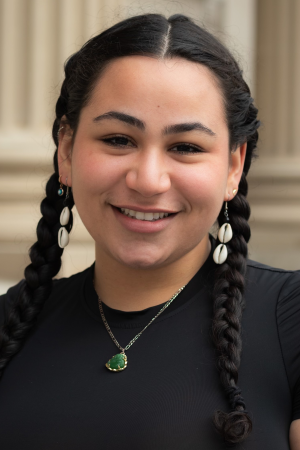Profile

Sage Friedman
New York,NY,USA
Highlights & Awards
- - Roles in plays and musicals between 2014-2019: starring roles in “Ashgirl” (2016), “St. Joan of the Stockyards” (2018), “Into the Woods” (2019)
- - High School Chorus; soloist in “City Called Heaven” (2017), “All I Want for Christmas is You” (2018), “Stand By Me” (2019)
- - Accepted for NYU Summer Intensive Opera training program, studied under Harolyn Blackwell (soprano)
- - Selected for private training with distinguished opera singer and professor Janna Baty (mezzo-soprano)
- - Selected for Yale University Battle of the Bands, April 2023
Bio
Music means a great deal to me. It is a consistent and reliable source of human power, one that can change form depending on where I am or what I need. And in times of complex social change – for example, the transition from high school to college – music has served a particularly important purpose. I have been musical for as long as I can remember. Along with every other 6 year old, my parents put me in piano lessons in the hopes that it would stick. It did, but not in the way they imagined it would; I preferred to sing the notes instead of play them, and before long, my piano teacher became my accompanist. The rush of allowing my voice to move in the ways it naturally wanted to, to feel the tremble of vibrato and finally have a name for it – whole worlds opened up, and I was lost in headphones and finger drumming and Apple Music’s “Jazz through the Ages” playlist. It wasn’t until high school that I began to sing opera: given a solo for my school’s choir and sent to study beneath the wing of a dazzling voice coach, my life took an unexpected turn. Me, Sage Friedman, brown girl, native New Yorker, lover of children, lactose intolerant, queer, swears like a sailor, hates wearing dresses: I was becoming an opera singer. Who could have guessed?
This isn’t just some sweet story about finding my lifelong passion. In my next year of high school I starred in Stephen Sondheim’s “Into The Woods” as Cinderella, where my director (slowly but surely) destroyed the confidence that my voice coach had given me. But her criticisms weren’t about my voice: they were about my body. She asked that I lose weight, that I stay out of the sun, and that I “lose the attitude.” For the six months that I played and sang as Cinderella, I lost the Sage I once knew to an assortment of feeble attempts at white-washed, genteel, antiquated feminity. I sucked in, kept my head low; quite literally forcing on a pair of heels that would never fit. The show went wonderfully. It was the highlight of my performative career to date. But what I took away from that production was a terrifyingly valuable lesson: there is a gap between people’s perceptions of (and opinions on) this somatic vessel that I reside in, and the sound that this vessel makes. My skin, my hair, my body, my “attitude” – none of this is conducive to the image of an opera singer.
I don’t know whether this realization strengthened or injured my conviction in practicing my skill, but I’m still here. I haven’t performed since: other than my parents, my current (wonderful) opera coach Janna Baty, and my showerhead, you will be the first to hear me sing opera in over three years. While I’m sure that’s a sad sentence to read, it wasn’t a sad one to write: during these three years, I’ve worked on my other passions. I love to paint, and have become a makeup artist for some Yale productions as well as for editorial undergraduate fashion magazines. My writing has improved drastically, and the feelings of academic loss and inadequacy left by the pandemic have softened into newfound intellectual curiosities. I fell back in love with my body: after years of abusing cardio, I realized that my body was actually meant to lift, not sprint. Just like that first time I let out a belt, or the first time I felt the tickle of vibrato, it feels good to use my body in the ways that are the most natural. And yet, despite seeing the exciting growth of these skills, I still felt like something was missing. Letting my voice fly, tucking in its loose edges, folding in trills or other ornamentations – it’s like water, or perfection. It’s the most organic desire I have.
In lieu of this realization, I’ve decided to stop hiding this part of myself for fear that it won’t fit with the other pieces. I love opera – Harolyn Blackwell remarked to me that poetry was the elevation of spoken language, and that opera was the elevation of poetry – and the fact that I can access emotional states that transcend human speech is intoxicating. I hope you see more than some audition tapes when you see me; I hope you see a person who is desperate to gain a clearer sense of herself through this work; a person who is committed to the comprehension of character and context that these works require; and a person who is hopelessly in love with the sounds of music.
© Copyright CS Music. All rights reserved. Terms, Conditions, & Privacy Policy.
Also see our Accessibility Statement.
